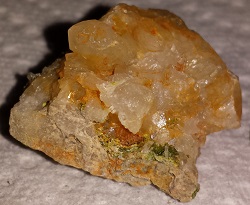A- |
B- |
C- |
D- |
E- |
F- |
G- |
H- |
I- |
J- |
K- |
L- |
M- |
N- |
O- |
P- |
Q- |
R- |
S- |
T- |
U- |
V- |
W- |
X- |
Y- |
Z |
PYROMORPHITE:PHYSICAL CHARACTERISTICS:Color is typically green, but can also be yellow, orange and brown. Luster is resinous to adamantine. Transparency: Crystals are rarely transparent, but usually translucent. Crystal System is hexagonal; 6/m Crystal Habits include the typical barrel shaped hexagonal prism with the hexagonal pyramid and/or a pinacoid as a termination. A classic specimen of Pyromorphite shows its arborescent habit as described above. Also granular, reniform, encrusting and massive. Cleavage is absent. Fracture is uneven. Hardness is 3.5 - 4. Specific Gravity is approximately 7.0+ (very heavy for translucent minerals) Streak is off white. Associated Minerals are cerussite, limonite, galena and secondary lead deposit minerals. Other Characteristics: Index of refraction is 2.05 (typically high for lead minerals) and crystal terminations can be hollowed out or pitted. Notable Occurrences include Idaho and Pennsylvania, USA; Mapimi, Mexico; Germany; England and Australia. Best Field Indicators are crystal habit, color, lack of transparency and density. Pyromorphite shares the same structure with apatite and therefore crystals of the two will have similar shapes. Pyromorphite also forms a chemical series with two other minerals; Mimetite (Pb5(AsO4)3Cl) and Vanadinite (Pb5(VO4)3Cl). This series is a little different than most chemical series which involve substitution of cations such as calcium for magnesium. Instead, this series substitutes its basic chemical units the anion groups; phosphate (PO4), arsenate (AsO4) and vanadate (VO4). Green Mimetite or yellow Pyromorphite can make identification between the two difficult, but usually pyromorphite is green and mimetite is yellow. Vanadinite is usually red. Pyromorphite's main characteristic is its unique crystal habit of stacked barrel shaped crystals that branch out in a way that is reminescent of some branching cactus varieties. |

